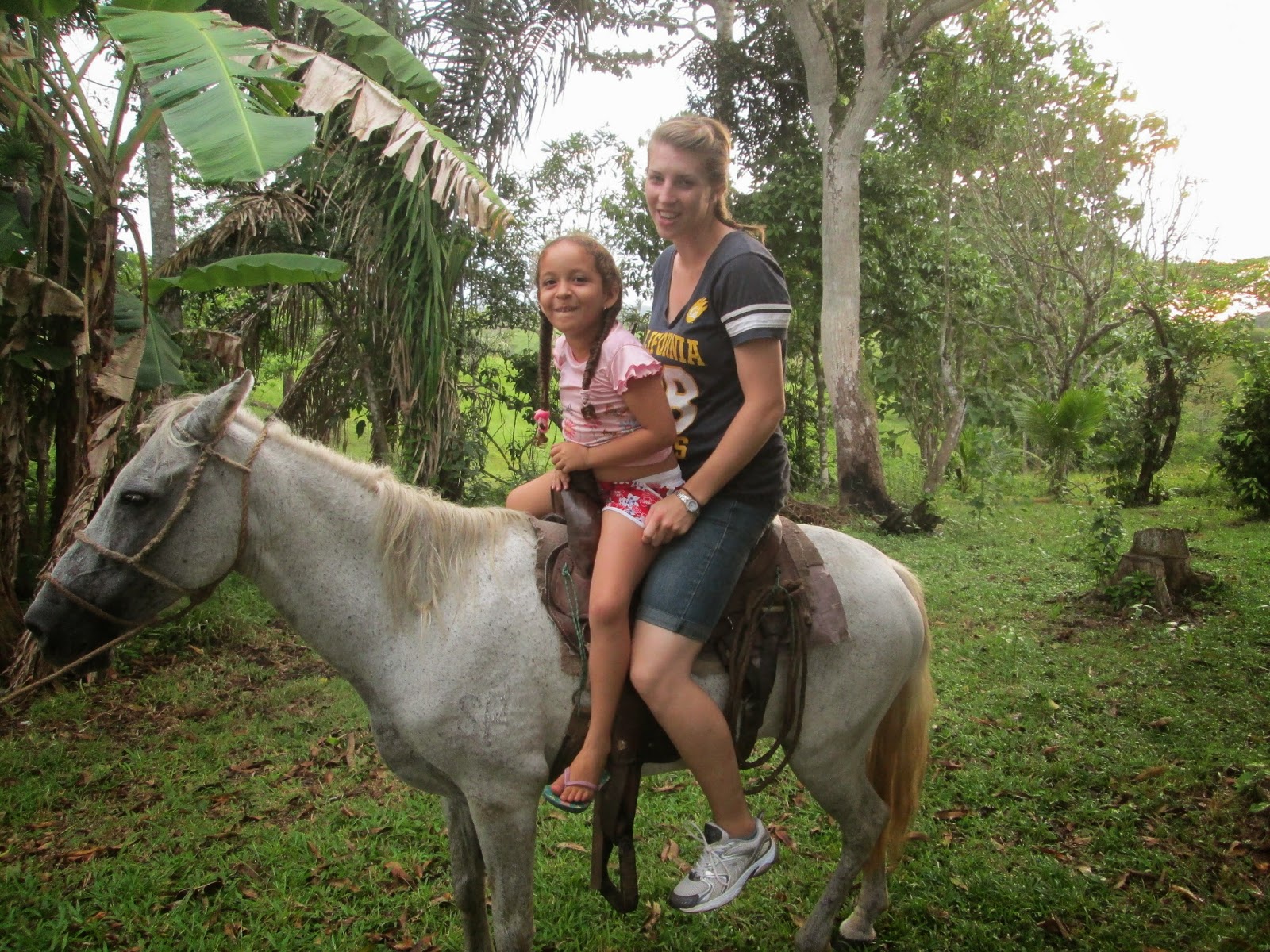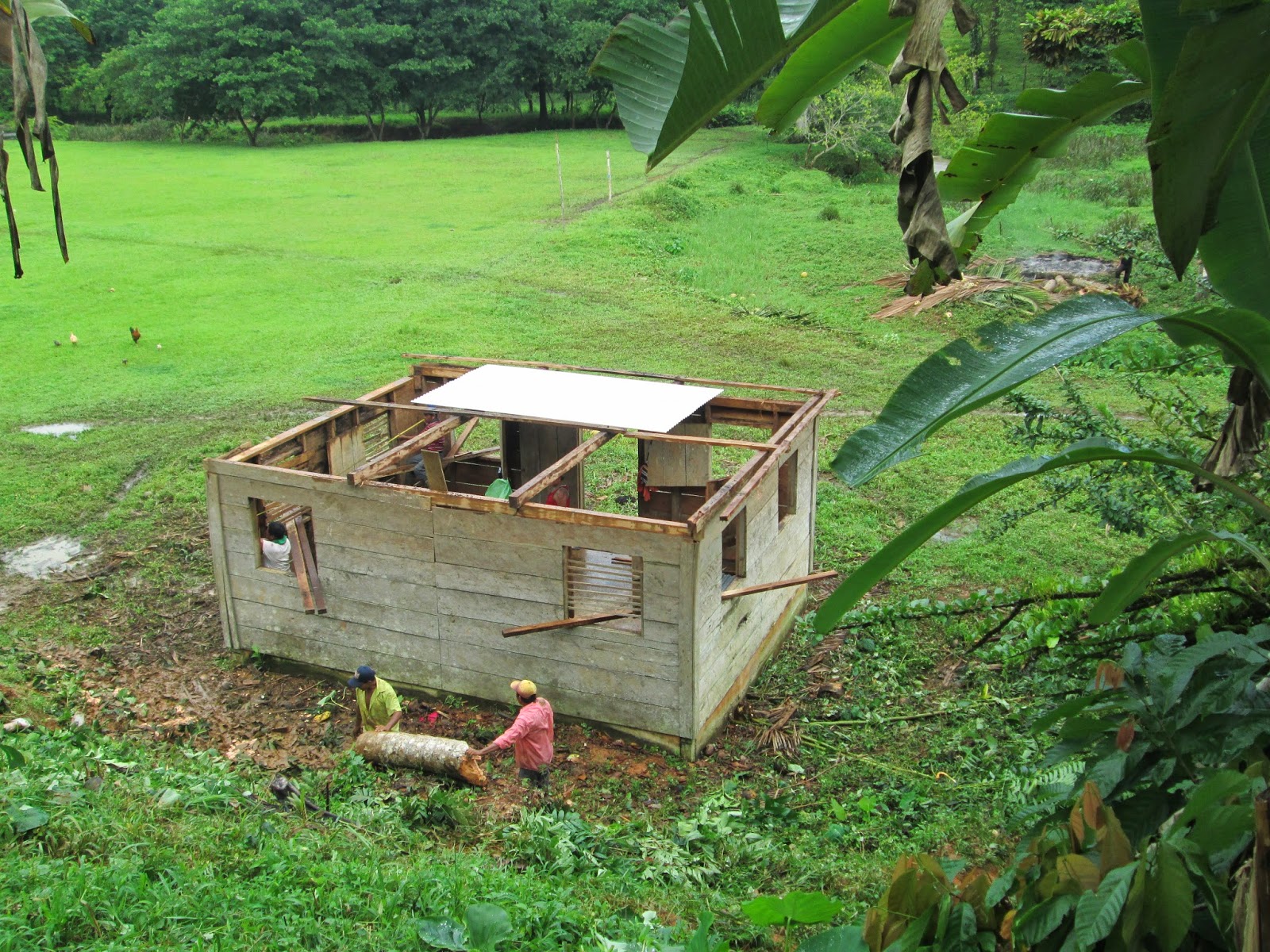My last
blog post I mentioned my house was “finished” but I only meant that the roof
was done and I was able to move in. I was far from being comfortable. I had
some stove issues for about a week and I was taking my food over to my host
mother’s house to cook. I also didn’t have running water or a bathroom but
thanks to some of my favorite community members, I am now connected to the
aqueduct and have a shower.
 |
| The "sink" with soon to be tubes. The trench is for drainage of water away from the house and into a nearby creek |
 |
| working on the trench |
The only thing I am missing now is a place to poop!
There is some talk of making me a latrine, but for the moment I am using a
bucket and mixing in ash and sawdust to make compost. I refuse to use the river
like many of my community members do. With my house finally finished, I thought
life would become much easier. I did not realize that I would once again be
going through a major adjustment period. Examples
Food: not
only is it hard cooking for one person, but it’s even harder when you don’t
have a refrigerator (no dairy in my life) and need to eat all your produce
before the vicious Panamanian ants take over
Social
life: my house is right smack center of the community so every person crossing
the community or when the kids are going to school, usually stop for a visit. I
have averaged 20 visitors a day (I include the kids who run in to say hola then
leave). While this has been a very lovely and welcoming experience, there are
times when I am trying to work, read, cook, talk on the phone, or just not
speak Spanish for 5 minutes. Also, whenever I have visitors I feel the need to
entertain: card games, showing them world maps, playing music, ect. While this
is definitely part of my job as a volunteer, I am slowly realizing that is impossible
for me to do this every time I have a visitor (especially 20 per day!). Also in
Ngabe culture there are often long silences. For me and many of my fellow
Americans, we have accustomed ourselves to think this is awkward and that we
must fill in the silences. Now I embrace the long silences (it’s a good time
for me to space out) and do not feel the need to stop what I am doing to
entertain or teach.
To show
my appreciation I had a house inauguration party. I opened the house for all
the see; people enjoyed my photos, the 3 huge maps on the walls (US, Panama,
World), coffee and cookies. I also brought out the UNO cards (thank you Laura!)
which lasted for 4 hours. I also used this opportunity to inform people of my
huge community analysis meeting.
The
community analysis meeting is a very important part of Peace Corps Service. It
usually takes place 3 months after “observation and integration” time in the
community and is when the community decides what exactly they would like your
help in. My boss and a local representative of ANAM were there to support me.
We met with the teachers first and my boss helped explain my role in environmental
education and how the teachers and I should collaborate together to bring more enviro edu in the curriculum. We then had a
meeting with community members (about 40 showed up, good turnout) to discuss my
work for the next 2 years. First. my boss reiterated why the first 3 months are
so important for integration and reassured them that I wasn’t lazy (3 months is
a long time to hang out without starting projects. Several other volunteers and
I have shared that some community members questioned when we were going to
start “working”). I then thanked them and shared what exactly I had learn in
the first three months. I then explained that with these learning experiences I
have made strong bonds with my community and now I feel very comfortable as if
they were my family. This is the part where I started to cry and saw several
woman crying as well. Once we got through the emotional babble I showed them a
list of all the possible projects that I had heard the people say they wanted.
It included:
Reforestation
Trash management
Ecological
Stoves
School/Community
Gardens
Solution
to the water problem
Latrines
Teaching English
Cacao farm
management
Artisan group
Botanical
house
We went over every topic and reiterated that my work is in conservation matters, therefore I cannot help out in areas such as latrines (plus the new Panamanian president promised "cero latrinas" or zero latrines)
The community voted for the top two projects they would like to work on, and we discussed areas in which I could also be of help but I cannot focus all of my energy in.
Reforestation won with 24 votes
Eco stoves with 16 votes (I will go into more depth of what an eco stove is in another post)
I will be helping organize a water committee and will have a series of seminars on how to have an effective committee. With the committee, we can solicit the support of the national health department. I have also recently been in contact with Engineers Without Borders, an NGO devoted in working with water projects, so I hope to receive the support from them.
I will be inviting cacao volunteers to give workshops on how to better management against fungus.
I will be holding English hours 3 times a week.
 |
| ANAM representative helping me explain why reforestation is important |
 |
| Voting for projects |
 |
| The results |
It seems that I will be very busy the next two years but I am happy to now have an idea of where my focus should be.
Lastly, I went to a Language Reinforcement training. Peace Corps offers to opportunity to receive some extra language classes a few months after being in site. I had the option of going to Spanish or Ngabe, but I decided Spanish since I know I will be using it after my service and I had many grammar questions. I traveled to Panama City for this week long training and it was great. I got to see a handful of other volunteers I had not seen since swear in. My host family was also amazing and I had the luxury of using an indoor shower, poopin in a flush toilet, eating ice cream and other dairy, and cooking latino food that I had missed so much. The family also took me to there far where we ate waaay to much food and enjoyed the scenery of the countryside
 |
| cooking pifa over the fire |
 |
| The farm |













